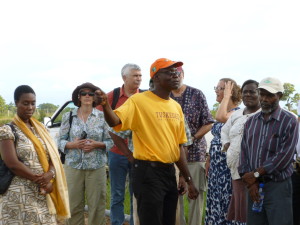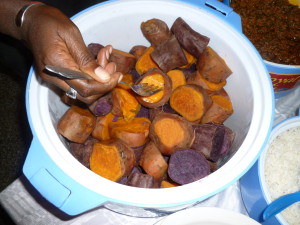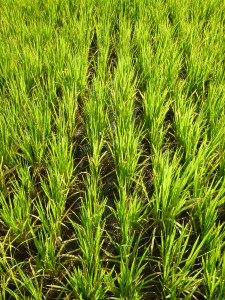Innovation Labs and Partners visit Feed the Future Ghana projects
Following the Feed the Future Innovation Labs for Collaborative Research partner’s workshop, a group of participants traveled north from Accra to Tamale to see firsthand how both research and development projects are addressing the issues driving the Feed the Future strategy in Ghana.

Kwabena Acheremu of the Savannah Agriculture Research Institute, discusses sweet potato field trials.
Feed the Future investments in Ghana are concentrated in the northern zone of the country where despite overall national reductions in poverty, progress has been slow. In this region of the country, including Upper East, Upper West, and Northern regions, poverty rates are double those in the south and underweight and wasting among children is significant. Feed the Future Ghana programs, including those implemented by the Innovation Labs for Collaborative Research, help to improve incomes and the nutritional status of women, men, and children through agricultural programs that target the soy, maize, and rice value chains and agriculture and nutrition linkages.
The two-day field visit built on the main themes of the Accra workshop which focused on critical research priorities related to agriculture and nutrition, scaling agricultural technologies, and developing collaborative partnerships. The field visit offered not only an opportunity to become more familiar with Feed the Future activities in Ghana, but also facilitated new relationships with other participants and research and development actors in the region.
Participants included staff from the Agriculture Research and Policy Division of USAID’s Bureau for Food Security Washington, as well as from USAID/Missions in Liberia and Nigeria. They were joined by Innovation Lab directors and representatives from Education and Research in Agriculture (ERA) Senegal, and the West Africa Agricultural Productivity Program (WAAPP).
On the first day participants engaged with researchers from the Horticulture Innovation Lab project on Sustainable Technology for Orange and Purple Sweet potato (STOPS) project led by Eunice Bonsi, a food and nutrition scientist at Tuskegee University. The research supports the production, marketing, and consumption of sweet potatoes as a means of addressing Vitamin A deficiency and improve food security. Dr. Bonsi and her team are working not only with farmers, but with bakers and food processors to diversify the use of sweet potatoes. For example, they are developing flours, breads, purees, and weaning foods to encourage greater adoption of sweet potato. Links with schools and orphanages, like the SOS Children’s Village visited during this trip, are essential to strengthening this chain. Participants on the trip were treated to a meal of sweet potato dishes, including the sweet potato bread that is being promoted locally.
The group also traveled to meet with representatives from the Savanna Agricultural Research Institute (SARI), which partners with several Innovation Labs including BASIS AMA, Horticulture, Peanut, and SANREM. During this meeting presentations were given by former CRSP students Abdulai Mumuni and Nicholas Denwar, who currently work at SARI, about ongoing research at SARI with the Peanut and Mycotoxin Innovation Lab on peanut production constraints. Mumuni completed his Master’s and Ph.D. with funding from the Bean/Cowpea CRSP while Denwar completed his Ph.D. with funding from the Peanut CRSP at Texas Tech University.
The second day included visits to two USAID/Ghana projects: the Agricultural Technology Transfer Project, implemented by the International Fertilizer Development Center (IFDC), and ADVANCE, implemented by ACDI/VOCA. These two projects aim to contribute to increasing the competitiveness of the rice, maize, and soy value chains, and facilitate private sector engagement in the sector.
Together with Edo Lin, of the IFDC, the group visited the Savanna Farmers Marketing Company that is introducing new technologies to farmers and strengthening linkages with buyers. The Feed the Future Ghana Agriculture Technology Transfer project is also working with local seed companies to strengthen the seed sector. Two seed companies spoke to the group about the challenges and opportunities that face the growth of their businesses.
The trip concluded with an introduction to the Feed the Future Ghana value chain project, ADVANCE, and a visit to the Bontanga Irrigation Project, a rehabilitated irrigation scheme. The afternoon also included a visit to Gundaa’s warehouse, a new facility that is allowing farmers in the area to benefit from a warehouse receipting program.


